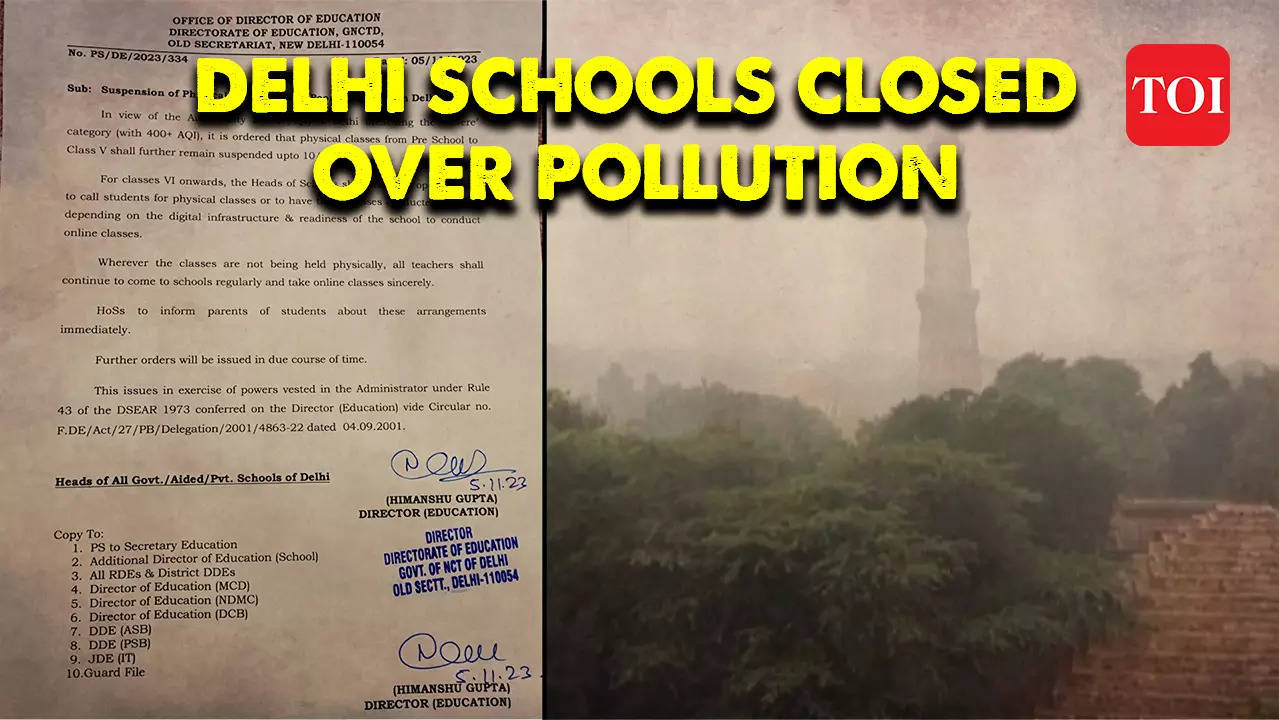


With Delhi and the NCR region facing severe air pollution levels, schools in Delhi and NCR have been closed and shifted to online classes for all students up to Class 12. The decision came after Stage IV of the Graded Response Action Plan was invoked in the NCR. This move has been followed by Tamil Nadu as well, with schools in five districts being closed due to heavy rainfall. However, the University of Delhi has refuted a fake circular announcing a winter holiday.
Delhi and NCR Battle Severe Air Pollution: Schools Closed, Online Classes Instituted
Delhi and the National Capital Region (NCR) have been grappling with alarming levels of air pollution, prompting authorities to take drastic measures to safeguard public health. As a result, all schools and colleges in the region have been closed, and students up to Class 12 have been shifted to online classes.
The decision to close educational institutions was made after Stage IV of the Graded Response Action Plan (GRAP) was invoked in the NCR. This stage mandates severe restrictions on construction activities, entry of trucks into Delhi, and other pollution-causing practices.
In addition to Delhi, Tamil Nadu has also been affected by severe weather conditions. Heavy rainfall has forced the closure of schools in five districts.
Meanwhile, the University of Delhi has dismissed a fake circular that announced a winter holiday. The university clarified that all academic and administrative activities will continue as per schedule.
Background
Air pollution has been a persistent problem in Delhi and the NCR for many years. The region's geography, coupled with high levels of vehicular traffic and industrial activities, contributes to the accumulation of pollutants in the air.
During the winter months, the situation often worsens due to unfavorable weather conditions. Cold temperatures trap pollutants near the ground, leading to a phenomenon known as "smog."
In recent years, the government has implemented various measures to combat air pollution, including:
Top 5 FAQs and Answers
1. What is the Graded Response Action Plan (GRAP)?
GRAP is a set of measures that are implemented based on the severity of air pollution levels. It includes five stages, each with progressively stricter restrictions. Stage IV is the most severe stage and involves measures such as school closures and restrictions on construction activities.
2. What is the difference between PM2.5 and PM10?
PM2.5 and PM10 refer to particulate matter with diameters of 2.5 micrometers and 10 micrometers, respectively. PM2.5 is considered more dangerous to human health as it can penetrate deeper into the lungs.
3. What are the health effects of air pollution?
Air pollution can cause a wide range of health problems, including:
4. What can individuals do to reduce air pollution?
5. What is the government doing to address air pollution?
The government has implemented various measures to combat air pollution, including:

A private bus carrying 41 passengers caught fire after colliding with a motorcycle on National Highway 44 in Kurnool district, Andhra Pradesh. Preliminary police investigations suggest that the motorcycle's fuel tank ruptured and leaked fuel, causing the fire. The bus was reported to have multiple challans for traffic violations, and investigations are ongoing to determine the exact cause of the accident.

The Madhya Pradesh Police has launched a new campaign called 'Nashe Se Doori Hai Zaroori' to create awareness among the youth about the dangers of drugs and addiction. The campaign, which is being led by Indian Navy Chief Admiral Dinesh Kumar Tripathi, aims to highlight the importance of keeping the young generation drug-free in order to safeguard the country's future. Tripathi has urged everyone to understand their responsibility in creating a better India and to stay away from the path of destruction that substance abuse can lead to.

Studies have shown that surrounding yourself with greenery has significant benefits for mental health, including lower stress levels and improved mood. Engaging with indoor plants has been linked to reduced blood pressure and improved relaxation. A 2023 study also revealed that caring for indoor plants can increase mental well-being and emotional balance. Discover the top 12 indoor plants that can improve your health, happiness, and indoor air quality.

Devotees from all over India flocked to Vishram Ghat in Mathura to participate in the annual Bhai Dooj festival, a celebration of the special bond between brothers and sisters. The ancient Yamraj Temple was the center of the festivities as devotees took a dip in the holy Yamuna River and performed rituals to honor Yamraj and Goddess Yamuna. The festival is believed to bring blessings of long life, happiness, and prosperity to siblings and is a symbol of love and protection in Hindu mythology.

On the auspicious occasion of Bhai Dooj, Prime Minister Narendra Modi, Union Home Minister Amit Shah, and Union Health Minister JP Nadda extended their heartfelt wishes to the nation, celebrating the sacred bond between brothers and sisters. This festival, also known as Bhaiya Dooj, Bhai Tika, or Bhau Beej, is widely celebrated across India with love and festivity, symbolizing the unbreakable affection and dedication between siblings. The day holds great significance in Hindu mythology and is associated with the liberation of all living beings from suffering and the bestowal of happiness.

On Wednesday, April 30, Hindus will celebrate the auspicious festival of Akshay Tritiya, also known as Akha Teej. This day is believed to bring luck and success, and is considered free from all malefic effects. People often buy gold on this day as it is believed to bring prosperity and wealth in the future. Akshay Tritiya is also considered to be ruled by Lord Vishnu, who is a revered deity in Hinduism. The best time to buy gold on this day is between 06:11 AM and 02:12 PM, according to Drik Panchang.

As Diwali comes to a close, the festival of Bhai Dooj celebrates the unconditional love and bond between brothers and sisters with various names across India. This year, Bhai Dooj falls on October 23, with the tilak ceremony auspicious time from 1:14 PM to 3:29 PM. It is a time to cherish the cherished memories and create stronger relationships between siblings. Share heartfelt wishes and blessings on this day to celebrate the beautiful bond of love and togetherness.

Marking a historic moment, President Droupadi Murmu offered prayers at the Sabarimala Temple in Kerala, becoming the first serving state head to do so. She climbed the 18 sacred steps to reach the shrine and offered darshan to Lord Ayyappa, carrying the sacred bundle on her head. This visit holds symbolic significance as the president represents both Vaishnavism and Shaivism, making it a moment of unity in Hinduism.

As Diwali celebrations come to an end, the day after is marked by the auspicious festival of Govardhan Puja or Annakut. In 2025, this festival falls on Wednesday, 22 October, and is a reminder to express gratitude towards nature and the environment. Devotees prepare special offerings and decorate their homes with flowers and diyas, honoring Lord Krishna and the bounty of nature. While the article provides general guidance, it also urges readers to consult experts before implementing any beliefs or practices discussed.

The Udupi Catholic diocese has extended warm Diwali greetings, citing the festival as a symbol of moving from darkness to light, falsehood to truth, and death to new life. The diocese emphasizes India's diversity and unity in celebrating different festivals together. Sharing a symbolic story, the diocese urges people to be the candle of hope that relights peace, faith, and love in the world. The message concludes with a call to action to be the light that builds bridges of love, faith, and compassion.